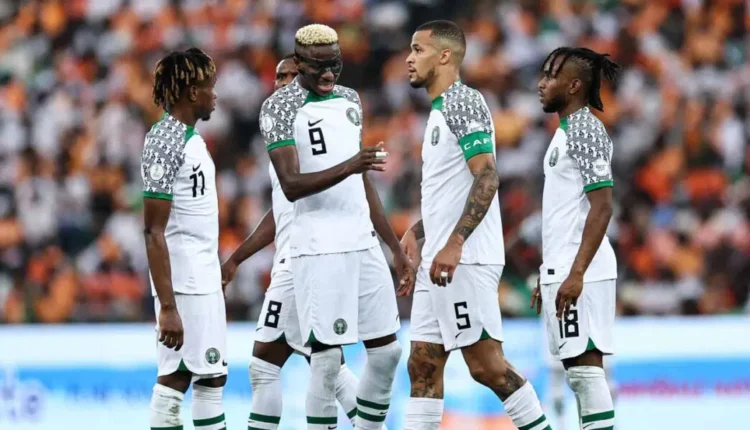Some football stakeholders have expressed disappointment over the Super Eagles’ exit from the 2026 FIFA World Cup playoffs, describing it as a major setback for the country’s football development.
The News Agency of Nigeria (NAN) reports that the Leopards of the Democratic Republic of Congo on Sunday defeated the Super Eagles in a sudden-death penalty shootout in Rabat, to advance to the Intercontinental Playoff.
Some football stakeholders, who spoke with the News Agency of Nigeria (NAN) on Monday in Abuja, called for major reforms in the country’s football administration.
Godwin Bamigboye, former Chairman, Football Coaches Association, FCT Chapter, said the greatest losers in Nigeria’s failure to qualify were the players, technical crew, backroom staff, and the Nigeria Football Federation (NFF).
”The players are the main losers. Two African Footballers of the Year will miss the World Cup. Their profiles will not improve, their clubs lose visibility, and potential endorsement opportunities disappear.
“Nigeria also lost out, and citizens are unhappy with the players and their handlers, including the NFF. You can add other things,” he said.
Bamigboye added that the players’ earlier boycott of training created a major distraction and affected their recovery after the energy-sapping match against Gabon.
He said the team struggled against a more determined DR Congo side in spite of securing the allowances they demanded.
He noted that Nigeria’s exit confirmed that much was wrong with the football system, stressing that football administration should not be reduced to personal or political interests.
He urged the NFF to apologise to Nigerians for the disappointment and commence a comprehensive review of the sport.
Femi Oyelade, another football enthusiast, criticised the state of the country’s football structure, saying many stakeholders appeared more interested in financial gains than national pride.
”It seems like many people only came to Morocco to collect their allowances, just like some irresponsible and corrupt football administrators.
“Our league, national teams, and development programmes are all struggling. We do not deserve to be at the World Cup.
“Our football is dead across the U-17, U-20, home-based Eagles, and Super Eagles,” he said.
Marcelo Houseman, an international football scout, lamented the continued selection of unfit or ageing players, adding that Nigeria had become “the joke of African football”.
He said progress would remain impossible without a competent coach who prioritises merit, discipline, and professionalism.
He recalled past successes under Coach Samson Siasia, noting that the 2005 FIFA U-20 World Cup final appearance, the 2008 Olympics silver medal, and the 2016 Olympics bronze medal.
“After politics got involved, we won nothing. This is very sad,” he said.
Other fans also expressed concern over the team’s poor display against DR Congo, noting that the Eagles struggled to control possession for most of the match.
They argued that only the defenders performed well and called for a reassessment of key players ahead of the Africa Cup of Nations.
Bahago Lawal urged NFF President, Ibrahim Gusau to resign, saying no apology would mitigate what he described as “a disaster caused to Nigerian football”.
Aliyu Usman questioned the team’s performance in the second half and extra time, describing it as embarrassing.
He added that it was better for Nigeria to stay away from the World Cup than to “go there and be disgraced”.
Ajobiewe Asikogu reacted to comments attributed to Coach Eric Chelle on alleged “voodoo,” describing such claims as unacceptable.
”If juju works, African teams would always win the World Cup. Congo also lost two penalties. This is medicine after death. We should be thinking of rebuilding with hungry and committed players,” he said.
James Alabi proposed the establishment of a football reform committee composed of experts with the mandate to study Morocco’s development model and replicate its structure in Nigeria.
He said such reforms should be treated as an emergency, independent of the existing government football organs.
Isma’eel Abba Tangalashi urged the NFF and the Nigeria Premier Football League (NPFL) to strengthen the domestic league, saying that a solid local competition is the true foundation for a successful national team.
He stressed the need for transparency, credible officiating, and equal opportunities for all clubs regardless of location or influence.
Tom Ojo blamed tactical errors for the loss. According to him, key substitutions weakened the team’s attacking structure.
He criticised the decision to leave Victor Osimhen out in spite of his importance and said internal disputes affected team cohesion.
Ojo recommended a complete overhaul of the technical team, performance-based player invitations, and the appointment of a strong psychological unit.
He also called for improved leadership on and off the pitch, a restructuring of the NFF technical committee, unity within supporters’ clubs, and the recruitment of a first-class coach with strong tactical and leadership.


